Today, I’ve turned forty. At least, this body has; ignorance doesn’t age, it remains fresh as ever. Now, I know that turning forty is not exactly an achievement, certainly nothing to write home about. But, I am extremely content, happy and at immense peace. My life is meaningful and of some use. I couldn’t ask for more.
I write long posts only twice a month on os.me. The first and third Saturday. But, for all the love you shower upon me, I thought how do I reciprocate and tell you how much it means to me? And then I had the idea of writing a post and share with you some untold stories from my childhood. The good, the bad and the ugly. Everything. Here are some of my adventures and beliefs from between the ages of five and eight.
I thought the people I saw in various programs on our TV actually lived in the TV. I still remember vividly the gentleman who came to fix our television set, I must have been around five years old. (Given how naive I had been, I might have even been six or seven, who knows). What I do remember is that it was my first time ever seeing someone repair a TV.
I’d asked my father at least ten times when the would TV guy come because I thought I would get to see and meet so many people as soon as he’d take the back cover off. They would be tiny people.
My father had told me the story of Gulliver in Lilliput and I was convinced that I would be Gulliver for these Lilliputians who would come tumbling out of the TV. How would I control them and send them back into the TV set? My heart raced with each screw he took out and put on the table, and then came the moment of truth: with both his hands, he gave the back cover a little jiggle and took it off.
What’s that? Just a big bulging tube and small cylindrical ones and a lot of dust. Completely oblivious to my pain, he blew the dust off the transistors and circuits and began soldering them. My whole world came undone in just a few moments. I toiled with the idea of what if those guys (the Indian version of Elmo and other people) were hiding in that tube that could not be opened but a part of me said it wasn’t possible. I nearly cried.
I ran to the rooftop and checked the pipe and looked at the antenna. Could they have fled using the antenna? No, I told myself. I took a little stick and drummed the pipe to see if they might be in there, but it sounded hollow. I became quite sad. So sad that my father agreed to take me on a ride on his scooter and buy me some candies.
On many rickshaws, I would see this line: do hi kaafi aur se maafi (Two are enough). It would show silhouetted outlines of two adults and two kids. I used to feel very sorry for the rickshaw-pedalers. Poor guy, he’s requesting that people not stack up on his rickshaw as most of the time a family of four or more would be on it. He’s telling everyone that he’d not allow more than two adults and two children on his vehicle. I noticed it on a lot of rickshaws.
I thought, they must have formed some kind of a team, sharing each other’s grief, and agreed to stick those messages on their rickshaws. What really intrigued me was when I saw the same messages written on buses. That doesn’t make sense. A bus certainly seats more than two adults and two children at any given time. Oh, I thought, it must mean to say please don’t overcrowd the buses, on each side of the bus, per row, a maximum of four people can sit. But why? They have marked each half of the row with three numbers.
Obviously, that’s for three adults; two children could easily fit in there with two grownups. Why can’t people be more sensitive? These buses and rickshaws wouldn’t have to plead like that. And then, I noticed the same message on auto-rickshaws which had two rows facing each other and it could easily seat more than four people.
Maybe they are talking about optimum seating. It was starting to get confusing. It didn’t help when I saw a big hoarding, at least 15 ft x 10 ft showing the same message. A big circle with two adults and two children in it with Do hi kaafi aur se maafi written next to it.
I reached home and noticed that there were ads on the TV saying the same thing: two people with a girl and a boy. The ad showed a family. Aha! I figured, they are saying that two children are enough in a family. A girl and a boy. My sister and brother were already there. So, I was the extra one, I concluded with some anxiety and much relief. I wasn’t sure what they would do with the third kid but I was relieved that at least I knew what it meant.
“Who gives you money?” I said to my father once. He told me that it was the government, beyond that he didn’t go into much detail. I asked my mother the same question and not surprisingly, she gave me the same answer.
“Every month, the government gives you this money?” I asked her curiously, pointing at the coins I was holding, to which she replied in the positive.
“How does the government get it? Is he very rich?” I thought the government was some person, one person.
“Your dad can better answer that question,” she said and went back to her cooking.
I ran to my father and as always, while at home, when not teaching his children, he would be reading some newspaper.
“How come the government is so rich?” I asked him. “From where does the government get the money to give you?”
He gave me a detailed run down over the next thirty minutes on the workings of a democratic system: a government by the people and for the people. He spoke about taxes and whatnot. All of which I heard keenly but none of which I understood at all. Not a word. He tried hard to explain that the government was not one person, a concept that didn’t make sense to me whatsoever. After all, someone was “handing” them the money. It had to be a person with hands.
“How can I make money like the government?” I said.
“Son,” he replied, “it’s your age to play and be merry, to enjoy your life and to study well. You shouldn’t be thinking about money. We’re here to fulfill your needs until you grow up.”
That was that.
But, every month when they would bring groceries and sweets etc. on the day they got paid, I always imagined a big hall full of people where each one was thrown a bag or something containing his/her salary. Don’t ask me how I got that visual, but it made the most sense to me at the time.
I always used to think that the children of various shopkeepers (provision stores and sweet shops etc.) were so lucky because their children could eat candies, chocolates, sweets, samosas and Maggi noodles to their hearts’ content. After all, their shops were full of them. We even had a shop in our neighborhood called Lucky Sweets.
Here’s something remarkable about my childhood that I haven’t told you. When I was growing up, I was so sure of my engineering skills that I would take perfectly well-functioning gadgets like our camera, transistor radio, watches, timepieces, clocks etc. and open them up completely, piece-by-piece.
All the while I would make meticulous mental notes on which screw would go where when I’d put them back. The end result, you ask? Well, after my careful opening, somehow the mental notes would disappear and I could never put them back together. What’s worse is that even the shopkeepers or the repairmen could not make these gadgets ever work again. The best part: my father never scolded me for breaking his things like that.
I had been wanting to get a particular book when I was seven or eight years old, most probably eight. But, I didn’t have the money. The library didn’t stock that book. So, I went to my favorite bookshop, a news agency, and picked up a magazine.
It was a small shop with books stacked from floor to ceiling. With my heart thumping, hot ears and cheeks, I waited for the moment when no one was looking and I put that thick book in the middle of the children’s magazine which was A4 in size. I knew well that it was called stealing and that not only was it morally wrong but unlawful too. Other than spreading rumors about someone, stealing, in my view, is the most immoral act one can do. And yet, fully conscious, I decided to execute my intent of theft.
I don’t remember the name of the book but the magazine was surely called Balhans. Other than Chandamama, Nandan, Parag, and Champak, Balhans was my favorite and I used to get all of them every month (some of them were fortnightly). This was in addition to Lotpot and other children’s comics; my father never spared any expense to get me my reading material. Anyway, so the shopkeeper knew me because I was at his shop practically twice a week, though I had always been accompanied by one of the family members. Today, I was on my own here.
He asked me what was I paying for. I carefully put the magazine on the counter and handed him a five rupee note, waiting to get my change of two rupees back. My plan had been to eat two gulab-jamuns (sweetmeats) on my way back home that would cost me two rupees.
I don’t know whether he saw the fear in my eyes, the tremble in my voice or maybe just the very obvious: an unusually thick magazine from which a book, while it lay in plain hiding, was peeping out carelessly. He lifted the magazine, opened it, took out the book, brought it closer to my face and said, “Are you a thief? Were you stealing my book? Should I take you to the police station?”
My heart came up in my mouth. I was terrified. All I wanted at that time was to be forgiven and be gone. That shame and humiliation were unlike anything I’d ever experienced before. It is a surprise I didn’t wet myself, I was so scared. All the other shoppers gathered quickly. A small crowd of 6-8 people surrounded me while the shop owner spoke to me.
“How have you come? With whom?” I’d come to his shop on my small bike. I wasn’t even allowed to venture out on my bike like this. I was not meant to be outside the radius of a couple of streets from our home, at the most. It was unsafe. And here I was, at least three kilometers or tens of streets out. At first, he didn’t believe that I was there on my own. He then asked me where my bicycle was. I pointed just outside his shop.
“Do you have the key to your cycle?” he said to me.
I pulled the key out of my pocket and stretched out my hand. He grabbed it and chucked it in one of the drawers on his side, next to the till. I stood there quietly and waited for quite some time, I don’t know how long now. But it was long enough that I was beginning to get worried about reaching home in time.
Every time I said sorry and asked him to let me go, he would tell me to wait. What was rather surprising was the fact that the other customers hung about to see what would become of me. I remember some of them asking me some questions but I don’t recall what conversation they struck with me at the time.
“I’ve seen you steal earlier too,” the shopkeeper said to me after tending to a number of his customers, “but I let you go every time.”
“No, Uncle, no,” I retorted vehemently. “That’s not true. I’ve never stolen anything earlier, ever.”
He quizzed me on how many siblings I had and where they were, and whether the ones who had accompanied me earlier were my family members or what. He then asked me what my parents did for a living, which school I studied at and said to me that he’d write to my school principal telling him that I was a thief. All of this was painful but I totally deserved it.
So, I didn’t cry or plead for mercy. I did apologize every time he uttered anything and assured him I’d never do it again. Although, I’m not sure if my statements were out of remorse or simply my ruse to get off the hook somehow and escape the embarrassment and shame. What he said next shook me to the core and I just wanted to disappear off the face of the earth.
“Is this what your parents have taught you?” he said. “Did they teach you how to steal from my shop? I’m sure you didn’t come up with the idea of putting a book in the magazine yourself?”
My eyes welled up.
“I’m very sorry,” I said, “my parents have not taught me this. I promise I’ll never steal again.”
An elderly person there urged the shopkeeper to let me go now, that I’d been made to wait for more than two hours and that I had been punished enough. Many customers had come and gone in those two hours, some hovered around and this elderly man was one of them. The shopkeeper warned me again and gave me back the keys to my bicycle. He slammed my magazine on the counter and put the due change on top but I was too ashamed and left both there and just zoomed out.
He called out to me when I was unlocking the cycle, which was right at the front of his shop, but I just didn’t want anything to do with anything or anybody. I paddled like there was no tomorrow and reached home as fast as I could. I never told anyone this until many years later when I shared it with my father and mother. Both of them heard the story teary-eyed and said they wished I’d shared it with them when it happened, that, they would have been there for me and all that.
The promise I made to myself the day I was caught stealing was that I would never do anything in life that would bring disrepute to my parents. I felt, they deserved better. I also learned that when we do something wrong, we shouldn’t expect the world to be by our side. A person in the wrong is the most lonely person in the world. Plus, of course, if you are going to quietly slip a thick book inside a thin magazine, make sure you eat your gulab-jamuns first.

Here are some pictures 1 of my life’s journey till now.

Thank you for your good wishes and for your faith in me. I want you to know that in return, I offer you the truth and my life. No matter how uncomfortable it may be for those who aren’t aligned with me, Swami will still walk the path of truth and tell you the same. I consider it my duty, my dharma.
Your words of love and care inspire me to do a bit more every time. It is because of your kindness alone that you show up every so often and shower upon me your love and goodness. I am grateful to you.
Love and peace,
Swami
PS. This is the second-longest post I’ve ever written on this blog. My Truth is the longest.
Notes
A GOOD STORY
There were four members in a household. Everybody, Somebody, Anybody and Nobody. A bill was overdue. Everybody thought Somebody would do it. Anybody could have done it but Nobody did it.
Don't leave empty-handed, consider contributing.It's a good thing to do today.[simpay id="204080"]


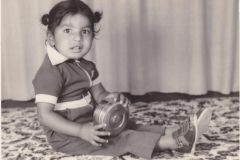
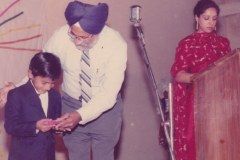
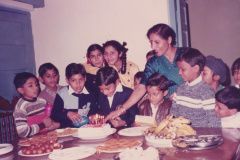
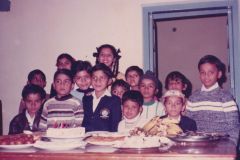
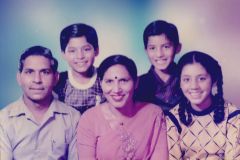

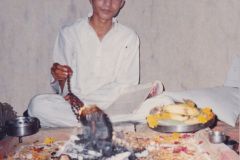
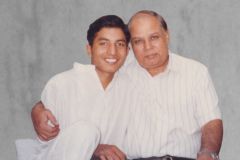











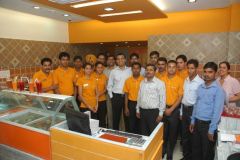
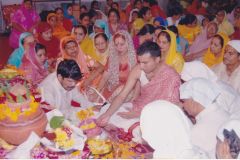







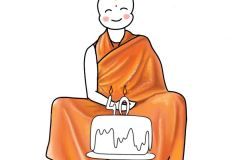




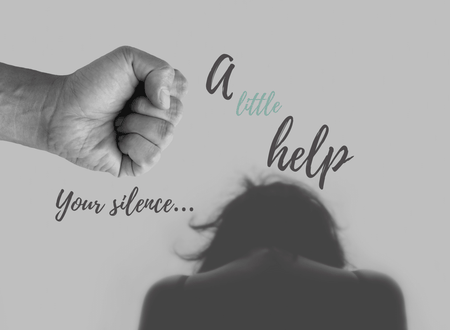


Comments & Discussion
264 COMMENTS
Please login to read members' comments and participate in the discussion.